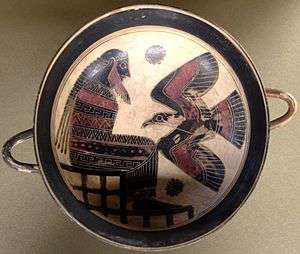Perioeci
The Perioeci or Períoikoi (Greek: Περίοικος, /peˈri.oj.koj/) were the members of a social class and population group of non-citizen inhabitants of Laconia and Messenia, the territory controlled by Sparta, concentrated in the coastal and highland areas.[1] The name Περίοικοι roughly means "those dwelling around/nearby", deriving from περί, peri, "around", and οἶκος, oîkos, "dwelling, house".
| Sparta |
 Zeus on his throne with his eagle This article is part of the series: |
| Great Rhetra Laws of Lycurgus Politeia |
|---|
| List of Kings of Sparta Gerousia Ephorate Apella Spartiates Perioeci Helots Agoge Syssitia |
|
Spartan army • Other Greek city-states • Law Portal |
They had a central role in the Spartan economy, controlling commerce and business, as well as being responsible for crafts and manufacturing, including producing the weapons and armour of the Spartan Army (the Spartans considered all commercial and money-making activities to be unworthy of them).[2] The Perioeci were also the only people allowed to freely travel outside the Spartan state's borders, which the Spartans were not, unless given permission.
Origin
The polis or city-state of Sparta was formed during the Greek Dark Ages, controlling the plains around the Eurotas river. Those communities already existing in the area which could not be assimilated into the Spartan state, or subjugated as helots, became the perioeci.[3] Whether they were Dorians like the Spartans, or descended from pre-Dorian populations in the Peloponnese, is unknown.[4]
Status
The Perioeci were free, unlike the helots, but were not full Spartan citizens. They lived in their own settlements in the perioecis, which were described by ancient authors as poleis.[5][6][7] These settlements were largely under the control of the Spartan state,[1] but were self-governing on domestic issues.[8]
The perioeci were obliged to follow Spartan foreign policy, and supplied men to fight in the Spartan army.[8] Like the hómoioi (Greek: ὅμοιοι, full Spartan citizens), the perioeci fought in the army as hoplites, probably in the same units.[9] The perioeci had the right to own land, which would have been necessary to support those in the army.[10]
In the Classical period, the Spartans were not permitted to engage in any economically productive activities, and so the perioeci were responsible for Spartan manufacturing, including producing weapons and armour, as well as conducting the trade that the Spartan state needed.[11] For instance, the large number of masks and figurines dedicated at the site of the Sanctuary of Artemis Orthia were probably produced by perioecic craftsmen.[12]
In Aristotle's Politics
The perioeci are mentioned in Aristotle's Politics but in a much more general sense than merely as those within the Spartan state. In describing the ideal state, Aristotle believed that the actual citizens and members of the state should be the rulers, the warriors (those who are allowed to bear arms), the statesmen and the priests but that those who perform trades, such as mechanics, craftsmen, husbandmen and farmers should be either slaves or perioeci, because such professions are ignoble and do not produce virtue, according to him. In that sense, the perioeci are meant to be common to all ideal Hellenic states, as a sort of middle class whose ranks the slaves may aspire to join, below the citizens but above slavery. They are free men, but they do not own property and are not allowed to vote, to hold office or to influence the state or the laws by any other means. When Aristotle mentions them, he sometimes refers to them as "barbarian" and implies that such non-citizen free men would be non-Hellenic foreigners.[13]
See also
References
- Cartledge, Paul (2002). The Spartans: An Epic History. Macmillan. p. 67.
- Cartledge, Paul (2002). The Spartans: An Epic History. Macmillan. p. 68.
- Toynbee, Arnold J. (1913). "The Growth of Sparta". The Journal of Hellenic Studies. 33: 247.
- Hammond, N.G.L.; Scullard, H.H., eds. (1970). Oxford Classical Dictionary (2 ed.). Oxford: Clarendon Press. p. 801.
- Herodotus, Histories, VII.234
- Thucydides, History of the Peloponnesian War, V.54.1
- Xenophon, Hellenica, VI.5.21
- Hammond, N.G.L. (1982). "The Peloponnese". In Boardman, John; Hammond, N.G.L. (eds.). The Cambridge Ancient History (2 ed.). Cambridge: Cambridge University Press. p. 333.
- Figueira, Thomas J. (1986). "Population Patterns in Late Archaic and Classical Sparta". Transactions of the American Philological Association. 116: 167.
- Ridley, R.T. (1974). "Economic Activities of the Perioikoi". Mnemosyne. 27 (3): 188. doi:10.1163/156852574X00070.
- Cartledge, Paul (2002). The Spartans: An Epic History. Macmillan. p. 68.
- Cartledge, Paul (2002). The Spartans: An Epic History. Macmillan. p. 99.
- Aristotle, Politics, VII.IX
Bibliography
- Aristotle, Politics. Translated by Jowett, Benjamin. http://classics.mit.edu/Aristotle/politics.7.seven.html: MIT Internet Classics Archive.CS1 maint: location (link)
- Paul Cartledge, Sparta and Lakonia. A Regional History 1300 to 362 BC, Routledge, New York City, 2002 (2nd edition) ISBN 0-415-26276-3
- Edmond Lévy, Sparte : histoire politique et sociale jusqu’à la conquête romaine (Sparta: Political and Social History until the Roman Conquest), Seuil, coll. "Points Histoire" (Points of History), Paris, 2003 ISBN 2-02-032453-9
- Finley, M.I. Ancient History, Evidence and Models, Chatto & Windus, (London 1985).
- Mathieu Aref, Grèce (Mycéniens=Pélasges) ou la solution d'une enigme (Greece (Mycenaeans=Pelasgians) Or A Solution To The Enigma) - Collection Mnemosyne (Mnemosyne Collection) - Paris 2004
- Andrey Zaykov. The Status of the Lakedaimonion perioikoi. Part I (In Russian + English summary: К вопросу о статусе лакедемонских периэков. Часть I). Published in: Issedon - ΙΣΣΕΔΩΝ: Almanac of Ancient History and Culture. Ekaterinburg: The Ural State University Press, 2003. Vol. 2. P. 16-44.
- Andrey Zaykov. The Status of the Lakedaimonion perioikoi. Part II. Published in: Issedon - ΙΣΣΕΔΩΝ: Almanac of Ancient History and Culture. — Ekaterinburg: The Ural State University Press, 2005. Vol. 3. P. 69-85.
External links
- . Encyclopædia Britannica. 21 (11th ed.). 1911.
- Ancient History - Perioikoi